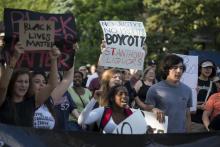The boycott of Russia gained brand buy-in faster than perhaps any other boycott campaign in history. Immediately after the invasion in February 2022, brands began shutting up shop in Russia. To date over 1,300 brands have curtailed operations in Russia, from Airbnb to Blackrock and Sainsbury’s.
The inevitability of brands jumping ship
Ending their operations in Russia wasn’t an easy step for many brands. For example, Russia accounted for 7% of McDonald’s global revenue, and initially it had no plans to vacate the region – but after public pressure mounted, including a Yale professor criticising McDonald’s on CNBC, the company announced it would join the mass exodus of brands leaving the country.
Public pressure was significant, including in the UK. A month after the invasion three-quarters of Britons wanted companies to stop doing business in Russia and 41% had considered or were boycotting brands that hadn’t left.
According to Yale, by May 2022 equity markets were rewarding companies that left Russia and “punishing those that remain behind, with divergent stock performance generally corresponding with the degree of Russian exit”.
Companies that dragged their feet and didn’t leave Russia quickly now face an additional problem – the risk of takeover. In April 2023, Putin signed a decree allowing the state to take “temporary” control of assets of companies or individuals from “unfriendly” countries. Russia then took over the subsidiaries of German energy giant Uniper SE and Finland’s state-owned utilities company Fortum.
Danish beer manufacturer Carlsberg A/S had been preparing a sale of the company for a year, with its Russia unit worth almost 10% of Carlsberg’s global revenue, but by July 2023 Putin had signed a decree to seize control of the business by transferring their shares to the government for “temporary management”. “There’s no way around the fact that they have stolen our business in Russia,” said Carlsberg CEO Jacob Aarup-Andersen.
According to Stephanie Baker, author of Punishing Putin, the takeovers showed that “Staying put had gone from a game of Russian roulette to an almost certain corporate death.”
Some brands continue to face criticism for continuing or deepening operations in Russia (such as BT Group, Diesel and Veolia). But on the whole, demands from campaigners calling on international companies to end direct operations in Russia have been overwhelmingly successful, with perhaps no other boycott call worldwide seeing the same level of commitment from global brands.





